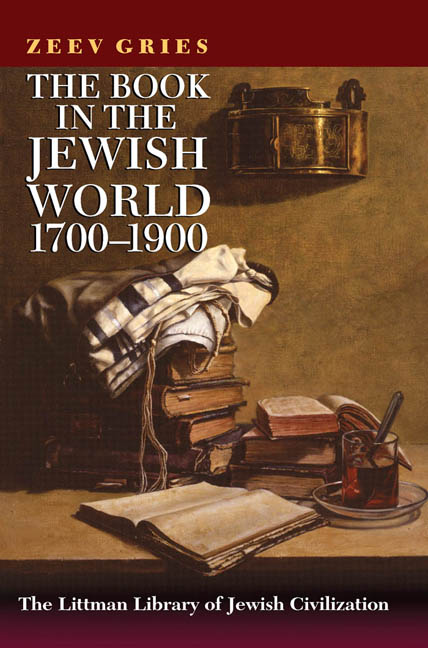
-
- This book is no longer available to purchase from Cambridge Core
- Publisher:
- Liverpool University Press
- Online publication date:
- July 2019
- Print publication year:
- 2007
- Online ISBN:
- 9781909821064


This book offers the reader a voyage in the new world that opened up to the enlightened Jewish reader of the eighteenth and nineteenth centuries, a time when the first glimmerings of emancipation and secular education were giving large numbers of Jews their first exposure to science, literature, and art, and opening their minds to new ideas. And as on any voyage led by a knowledgeable guide, there are fascinating side-trips along the way: insights into the world of scholarship, then and now, and into the nature of knowledge.All this was happening at a time when Jews’ civil status and place in society was undergoing great change in Europe. In this seminal work, Zeev Gries shows that although the history of the book in the Jewish world has long been regarded as the province of librarians and bibliophiles, it is in fact the history of the Jewish intellect. He starts by tracing the awakening of a dormant Jewish intelligentsia—men, women, and children who were thirsty for knowledge. Books were the magic kiss that opened new doors to the modern world; within a century, Jews were making invaluable contributions to the advancement of science and of culture more generally. By surveying the literary output of those years, the author is able to discover what books were being published, where they were published and distributed, and who was reading them. He surveys the fields of halakhic literature, ethical literature, kabbalistic and mystical literature, literature for children and women, and more general literature. He talks about the role of libraries and of book reviews. Above all, he considers the role of books as agents of culture: were they guardians of hallowed sanctity or harbingers of secularization?Gries shows how the types of books favoured by the Jewish reading public offer an insight into the changing nature of their ‘portable homeland’. He then goes on to discuss the Haskalah movement and the tensions between increasing secularization and the more traditional world-view, as well as how the resurrection of Hebrew as a secular literary language contributed to the awakening of Jewish nationalism. Nevertheless, he argues that the study of literary history of the period reveals that secular and Zionist leanings were not the only trends present; Jewish literature continued to be permeated with the spirit of religion.
 Loading metrics...
Loading metrics...
* Views captured on Cambridge Core between #date#. This data will be updated every 24 hours.
Usage data cannot currently be displayed.